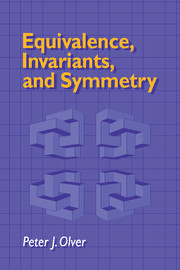Book contents
- Frontmatter
- Contents
- Preface
- Acknowledgments
- Introduction
- 1 Geometric Foundations
- 2 Lie Groups
- 3 Representation Theory
- 4 Jets and Contact Transformations
- 5 Differential Invariants
- 6 Symmetries of Differential Equations
- 7 Symmetries of Variational Problems
- 8 Equivalence of Coframes
- 9 Formulation of Equivalence Problems
- 10 Cartan's Equivalence Method
- 11 Involution
- 12 Prolongation of Equivalence Problems
- 13 Differential Systems
- 14 Frobenius' Theorem
- 15 The Cartan–Kähler Existence Theorem
- Tables
- References
- Symbol Index
- Author Index
- Subject Index
13 - Differential Systems
Published online by Cambridge University Press: 05 August 2012
- Frontmatter
- Contents
- Preface
- Acknowledgments
- Introduction
- 1 Geometric Foundations
- 2 Lie Groups
- 3 Representation Theory
- 4 Jets and Contact Transformations
- 5 Differential Invariants
- 6 Symmetries of Differential Equations
- 7 Symmetries of Variational Problems
- 8 Equivalence of Coframes
- 9 Formulation of Equivalence Problems
- 10 Cartan's Equivalence Method
- 11 Involution
- 12 Prolongation of Equivalence Problems
- 13 Differential Systems
- 14 Frobenius' Theorem
- 15 The Cartan–Kähler Existence Theorem
- Tables
- References
- Symbol Index
- Author Index
- Subject Index
Summary
The results that form the theoretical foundation of the Cartan equivalence method all ultimately rest on the existence of solutions to certain systems of partial differential equations which are defined by the vanishing of a collection of differential forms. The final part of the book is devoted to a fairly detailed exposition of the necessary existence theory for such systems of partial differential equations. The two fundamental results are the well-known Frobenius Theorem, to be covered in Chapter 14, and the more complicated Cartan–Kähler Theorem, which is discussed in Chapter 15. To properly formulate these two existence theorems, we first need to present a basic summary of the theory of differential systems, and this forms the topic of the present preliminary chapter. More extensive treatments of these matters can be found, for instance, in [28], [36], and [230]. We begin our discussion by formalizing the basic terminology.
Differential Systems and Ideals
In general, by a differential system we will mean a collection of differential forms {ω1, ω2, …} defined on an m-dimensional manifold M. A submanifold N ⊂ M is called an integral submanifold if it annihilates all the forms in the differential system, meaning that each form ωi vanishes when restricted (pulled back) to the submanifold: ωi|N = 0. Given a differential system, our principal goal is to find integral submanifolds N ⊂ M of a prescribed dimension n. Now, if N is an integral submanifold, and η is any differential form, not necessarily in the system, then its wedge product η∧ωi with a form in the system also vanishes on N, so that we may as well include all such differential forms in our differential system.
- Type
- Chapter
- Information
- Equivalence, Invariants and Symmetry , pp. 409 - 420Publisher: Cambridge University PressPrint publication year: 1995



